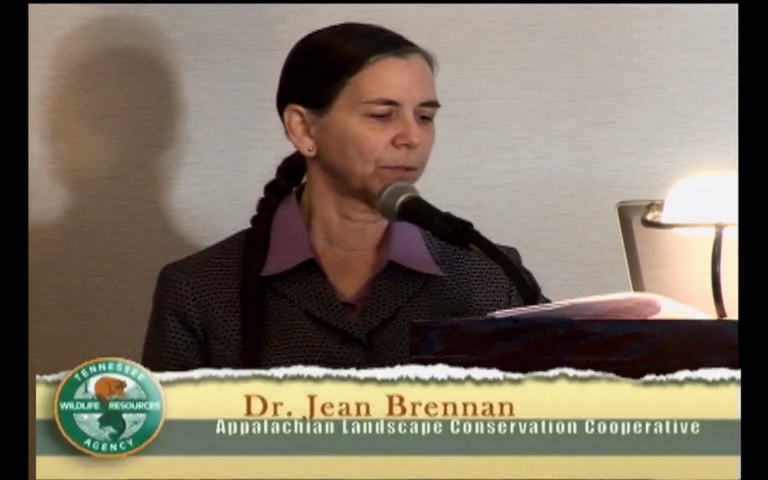LCC Coordinator is Invited Speaker at Tennessee Fish and Wildlife Commission Meeting
Photo of Tennessee Wildlife Resources Agency Executive Director Ed Carter, Dr. Jean Brennan, and Tennessee Fish and Wildlife Commission Chairman Jeffrey Griggs.
The Tennessee Fish and Wildlife Commission is the elected, governing body of the Tennessee Wildlife Resources Agency, which preserves, conserves, manages, protects, and enhances the fish and wildlife of the state and their habitats for the use, benefit, and enjoyment of the citizens and visitors of Tennessee. Dr. Brennan provided information to the Commission on the evolution of the LCC network, the science and conservation planning process underway within the Appalachians, and reviewed currently funded conservation research and resulting management tools and products.
“Having the Appalachian LCC Coordinator speak at our Commission meeting shows how significant landscape conservation is to the state of Tennessee,” said Mark Thurman, an Appalachian LCC Steering Committee member and Regional Fisheries Program Manager for the Tennessee Wildlife Resources Agency. “We very much value the tools, information, and collaboration that are being developed through these regional partnerships for our resource planning and management.”
The first part of Dr. Brennan’s presentation discussed what LCCs are and why they were proposed. She went into detail on how LCCs are a national network of self-directed partnerships set up to link the science and management communities to better inform decisions and develop tools and information to meet the shared needs of a region. This function has never been greater, as population pressures and climate change are threatening diversity, the benefits nature provides, and recreational opportunities. LCCs were created to meet these challenges by managing through partnerships at the landscape level to determine how, where, and when to respond to and anticipate major changes on the landscape. Through landscape-level planning and support for conservation actions and research, LCCs work to protect the valued resources and biological diversity of the nation while sustaining the benefits provided by healthy and resilient ecosystems to human communities.
Dr. Brennan then went into the science and conservation planning process the Appalachian LCC is undertaking. The Cooperative is coordinating with the Appalachian conservation community and stakeholders to collaborate on the LCC’s projects and activities addressing factors affecting fish and wildlife and cultural resources. This work includes biological planning, conservation design for large landscapes, applied research, and monitoring/evaluation to improve scientific understanding over time.
The final part of the presentation focused on the critical research the Cooperative is funding to deliver decision-support tools and products for resource management. Examples of these projects include: Ensuring Climate Resilient Aquatic Communities which developed an innovative decision‐support tool to safeguard valued aquatic resources under predicted climate changes across the region by improving habitat restoration targeting for riparian corridors; Information on the Climate Vulnerability of Appalachian Species and Habitats, a report that addresses how the Cooperative should acquire information about the climate vulnerability of Appalachian species and habitats and share with its partners; a Data Needs Assessment that delivered a suite of conservation planning products and data as well as identified data gaps to improve conservation planning in the region; and additional research.
Jean’s entire presentation is available at: http://twraonline.org/TFWC/october-2014.html (scroll to the last presentation at the bottom, TFWC Commission Meeting Part 2).























